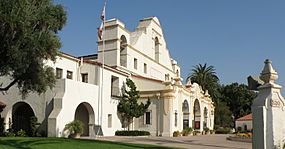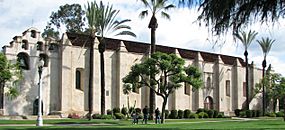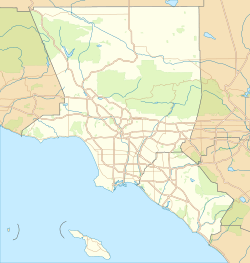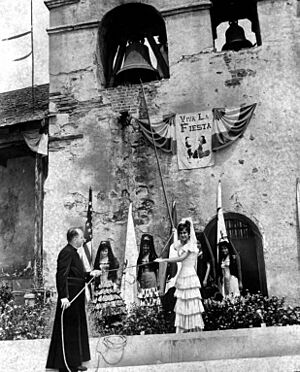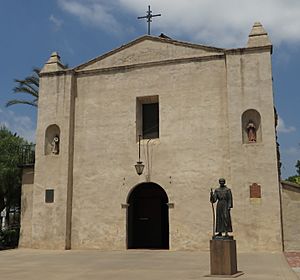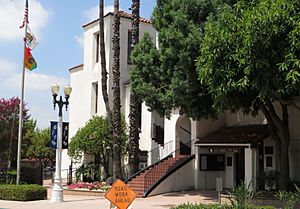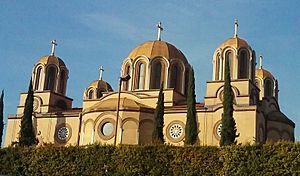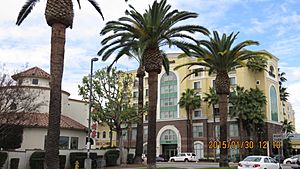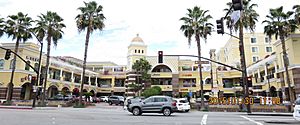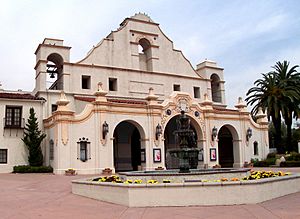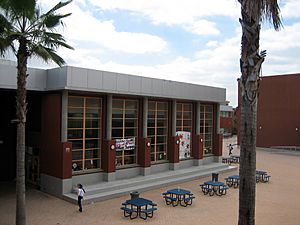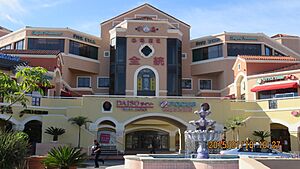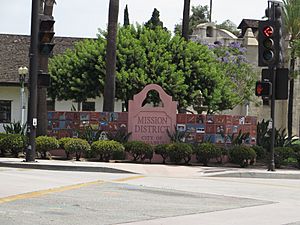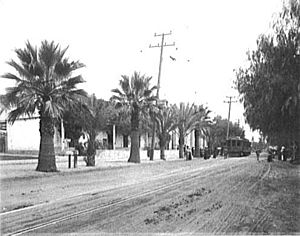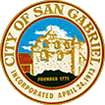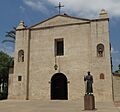San Gabriel, California facts for kids
Quick facts for kids
San Gabriel, California
|
|||
|---|---|---|---|
|
|||
| Motto(s):
"City With A Mission"
|
|||
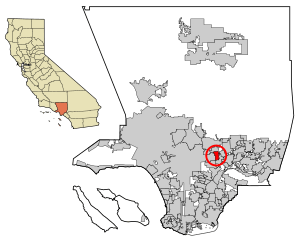
Location of San Gabriel in Los Angeles County, California
|
|||
| Country | United States | ||
| State | California | ||
| County | Los Angeles | ||
| Incorporated | April 24, 1913 | ||
| Named for | Archangel Gabriel | ||
| Area | |||
| • Total | 4.15 sq mi (10.74 km2) | ||
| • Land | 4.14 sq mi (10.73 km2) | ||
| • Water | 0.00 sq mi (0.00 km2) 0.02% | ||
| Elevation | 420 ft (128 m) | ||
| Population
(2020)
|
|||
| • Total | 39,568 | ||
| • Density | 9,626.8/sq mi (3,716.92/km2) | ||
| Time zone | UTC-8 (Pacific Time Zone) | ||
| • Summer (DST) | UTC-7 (PDT) | ||
| ZIP codes |
91775, 91776, 91778
|
||
| Area code | 626 | ||
| FIPS code | 06-67042 | ||
| GNIS feature IDs | 1656614, 2411787 | ||
San Gabriel is a city in the San Gabriel Valley of Los Angeles County, California. Its name comes from the Spanish for "St. Gabriel". In 2010, about 39,718 people lived here.
The city was started by the Spanish in 1771. This was when Mission San Gabriel Arcángel was built by Saint Junípero Serra. San Gabriel was very important during the Spanish and Mexican times. It helped Los Angeles and Californio society grow. Because the Mission San Gabriel was so important, the city is often called the "birthplace of the Los Angeles region".
Contents
History of San Gabriel
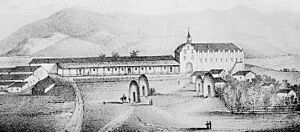
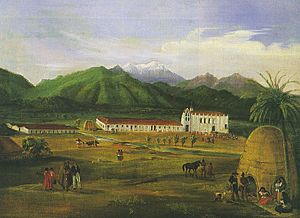
Early People: The Tongva
Before the Spanish arrived, the Tongva lived in the San Gabriel area. The Spanish called them the Gabrieleño. The Tongva village of Shevaanga was where the first Mission San Gabriel was built. In 1776, the mission moved to another village site called Toviscanga. This happened after a flood damaged the first site. These villages were connected by trails and were part of a large trade network.
Spanish Rule and the Mission
Mission San Gabriel Arcángel was founded by Father Junípero Serra in 1771. It was the fourth of 21 California Missions. It is known as the "Pride of the California Missions". The Tongva people, who worked at the mission, sometimes disagreed with the missionaries. In 1785, a major uprising happened. It was led by Toypurina and Nicolás Josè. This happened after Spanish missionaries stopped Christian converts from dancing and doing ceremonies.
Mexican Period and Pio Pico
The Mission San Gabriel Arcángel was very important in Californio society. Many of the first Mexican settlers in the area were baptized there. This included Pio Pico, who later became governor. He was born at the mission in 1801 and baptized there. Pio Pico was California's governor twice. He served briefly in 1832 and again from 1845 through the Mexican–American War. Later, he was elected to the Los Angeles City Council. The city of Pico Rivera is named after him. He was the last governor of California born in Mexico.
American Period and City Growth
In 1853, a group of Army Engineers visited the mission. They were looking for the best route for a railroad across the country. A geologist named William P. Blake noticed that the mission's vineyards were overgrown. Fences were broken, and animals roamed freely. But the mission bells still rang, and the church was in use. Blake believed that California would become famous for its fruits and wines.
In 1860, the first U.S. census in California counted 586 people in San Gabriel township. This area included the mission lands and nearby ranches. By 1870, the population had gone down to 436. San Gabriel officially became a city on April 24, 1913. At that time, about 1,500 people lived there.
Geography and Nature
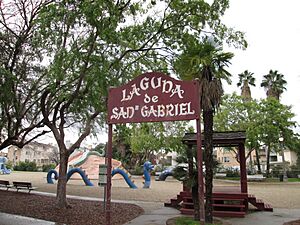
San Gabriel covers about 4.1 square miles (10.7 square kilometers). Almost all of this area is land. The city is in the San Gabriel Valley. It is surrounded by other cities. To the north is San Marino. To the east are Temple City and Rosemead. To the south is Rosemead, and to the west is Alhambra.
Parks and Recreation

The Parks and Recreation Department in San Gabriel offers many activities. They have after-school sports and a summer playground program for kids. They also plan trips and special events for young people all year.
Some of the parks in San Gabriel include:
- Adult Recreation Center and Senior Center, 324 South Mission Drive
- Bovard-Wilson-Hayes House and Jail
- Grapevine Park and Arbor, 324 South Mission Drive
- Smith Park and Pool, 232 West Broadway
- Vincent Lugo Park, Corner of Wells and Ramona Streets
Climate
San Gabriel has a hot-summer Mediterranean climate. This means summers are hot and very dry. Winters are mild, with comfortable temperatures.
People of San Gabriel
| Historical population | |||
|---|---|---|---|
| Census | Pop. | %± | |
| 1900 | 737 | — | |
| 1920 | 2,640 | — | |
| 1930 | 7,224 | 173.6% | |
| 1940 | 11,867 | 64.3% | |
| 1950 | 20,343 | 71.4% | |
| 1960 | 22,561 | 10.9% | |
| 1970 | 29,336 | 30.0% | |
| 1980 | 30,072 | 2.5% | |
| 1990 | 37,120 | 23.4% | |
| 2000 | 39,804 | 7.2% | |
| 2010 | 39,718 | −0.2% | |
| 2020 | 39,568 | −0.4% | |
| 2023 (est.) | 37,732 | −5.0% | |
| U.S. Decennial Census | |||
Population in 2010
In 2010, San Gabriel had a population of 39,718 people. Most people (98.9%) lived in homes. About 60.7% of the people were Asian. About 25.4% were White. And 25.7% of the people were Hispanic or Latino.
There were 12,542 households in the city. About 36.2% of these homes had children under 18 living there. The average household had 3.13 people. The average family had 3.47 people.
The population included 19.8% under 18 years old. About 14.0% were 65 years or older. The average age in San Gabriel was 40.3 years.
Population in 2000
In 2000, San Gabriel had 39,804 people. The city had 12,587 households. About 35.7% of these homes had children under 18. The average household size was 3.10 people.
The population was spread out by age. About 23.5% were under 18. And 13.4% were 65 or older. The average age was 36 years.
The average income for a household was $56,720. About 12.9% of the population lived below the poverty line. This included 17.4% of those under 18.
Economy and Jobs
San Gabriel has many businesses. Here are some of the biggest employers in the city, based on a 2019 report:
| # | Employer | # of Employees |
|---|---|---|
| 1 | AHMC San Gabriel Valley Medical | 1062 |
| 2 | Landwin Hospitality LLC | 150 |
| 3 | Ivy Creek Healthcare & Wellness Centre | 147 |
| 4 | SGV Healthcare Inc. | 147 |
| 5 | 99 Ranch Market #208 | 143 |
| 6 | Royal Vista Care Center, LLC | 123 |
| 7 | San Gabriel Country Club | 120 |
| 8 | Pine Grove Healthcare & Wellness Centre | 116 |
| 9 | Five Star Seafood Restaurant | 105 |
| 10 | San Gabriel Superstore | 105 |
Education in San Gabriel
Most of San Gabriel is served by the San Gabriel Unified School District. This district has five public elementary schools. It also has Jefferson Middle School and Gabrielino High School. Del Mar High School, which opened in 2010, is an alternative high school.
Parts of San Gabriel are also in other school districts. These include the Garvey School District and the Alhambra Unified School District. Two elementary schools in the city are run by the Garvey School District. San Gabriel High School is part of the Alhambra USD.
Some areas are also in the Rosemead Elementary School District and the El Monte Union High School District.
San Gabriel Mission High School is a Catholic school just for girls.
Culture and Community
San Gabriel has a mix of Asian, European, and North American cultures. Many Chinese Americans, including second and third generations, enjoy the city's many stores and restaurants.
There is a large shopping center called "San Gabriel Square." It covers 12 acres (about 4.9 hectares). Some people call it the "Chinese Disneyland." The Los Angeles Times also nicknamed it "the great mall of China." This area has many Chinese shops and unique buildings with Spanish-style tile roofs. It is a good example of new "ethnoburbs" found in places like Las Vegas and Houston.
Transportation
The city of San Gabriel has public transportation. It is served by the Los Angeles County Metropolitan Transportation Authority.
In 2008, voters approved a plan for the California High-Speed Rail Project. This project aims to build a fast train system from San Diego to San Francisco. The first part, from San Francisco to Los Angeles/Anaheim, is planned to be built first. It is expected to be finished by 2029. The second part, from Los Angeles to San Diego, will start after the first part is done. The California High-Speed Rail Authority is in charge of planning and building this system.
People were excited about the idea of a high-speed train. However, some residents became worried when they learned it might affect their homes. When the California High-Speed Rail Authority met with city councils and residents, people were concerned. Mayor David Gutierrez said that San Gabriel would not allow anything that would make people lose their homes. No final decisions will be made until studies on the environmental impact are completed.
Notable People from San Gabriel
Many interesting people have connections to San Gabriel:
- Rick Aguilera, a Major League Baseball pitcher, was born here.
- Hank Aguirre, another Major League Baseball pitcher.
- Judge Roy Bean, a famous figure from the Wild West.
- Jesse Chavez, a Major League Baseball pitcher.
- Mike Garcia, a Major League Baseball pitcher.
- Curly Howard, a well-known comedian and actor.
- Ward Kimball, an animator who worked for Disney.
- Mike Krukow, a Major League Baseball pitcher and TV commentator.
- Billy Laughlin, a child actor.
- Gary McCord, a professional golfer and TV commentator.
- Bill Mumy, an actor.
- Danny Patterson, a Major League Baseball pitcher.
- General George S. Patton, a famous general from World War II.
- Pio Pico, the last Mexican Governor of California.
- Allan Sandage, an astronomer.
- Tex Schramm, the first general manager of the Dallas Cowboys, was born here.
- Laurence Trimble, a silent film actor.
- Kurt Vollers, a professional football player.
- Joanna Wang, a singer-songwriter.
Sister Cities
San Gabriel has a sister city:
 Changhua City (Changhua County, Taiwan) - since 1986
Changhua City (Changhua County, Taiwan) - since 1986
Images for kids
See also
 In Spanish: San Gabriel (California) para niños
In Spanish: San Gabriel (California) para niños
 | Charles R. Drew |
 | Benjamin Banneker |
 | Jane C. Wright |
 | Roger Arliner Young |


